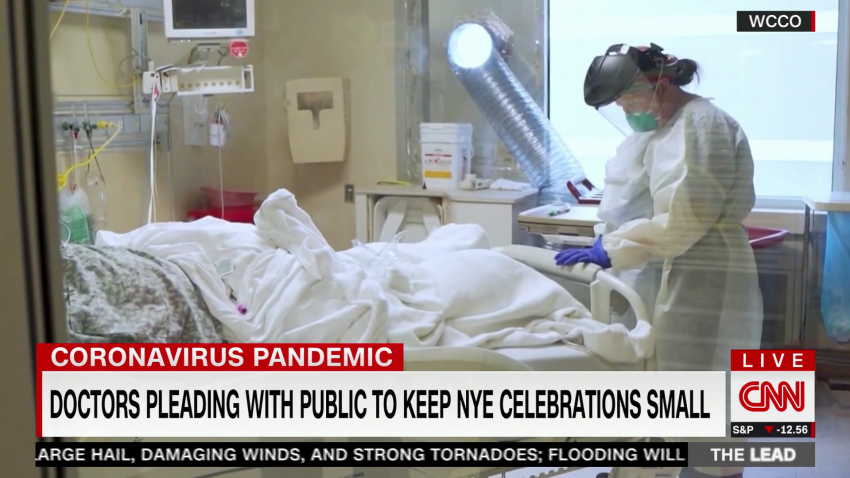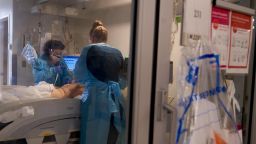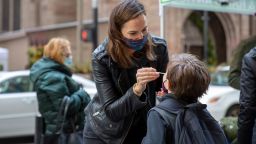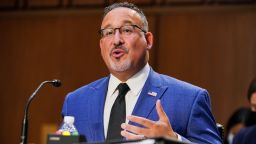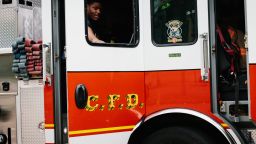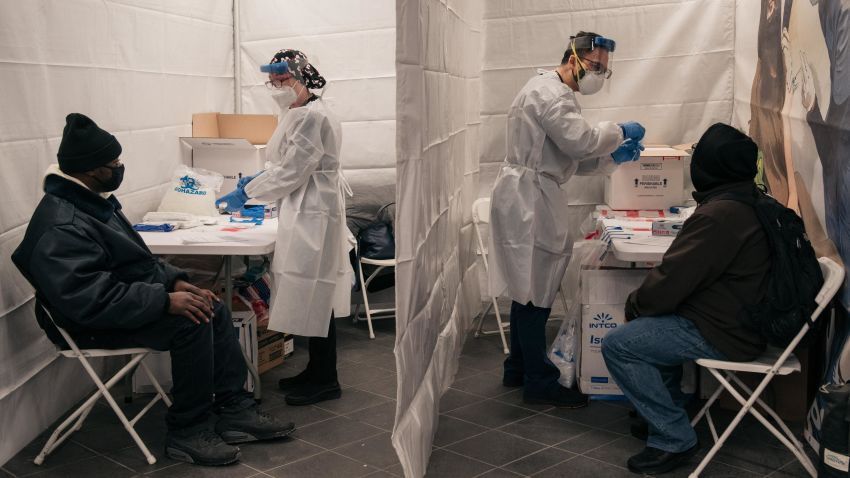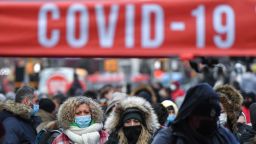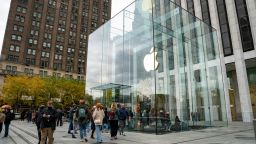Over the weekend, at least five metro Atlanta school districts announced they would shift to remote learning for the first week of the new year as students return to school after a holiday break that saw the Omicron variant spread even further out of control.
The announcements came days after six major hospital systems in the area reported 100% to 200% increases in Covid-19 hospitalizations. Elsewhere, positive Covid-19 tests forced some restaurants to close at what could be one of their busiest times of year.
These were the impacts Covid-19 and the Omicron variant had in just one American city as the country grapples with another surge as the pandemic marches towards its third year.
The United States broke its average daily Covid-19 case record again Sunday, with 404,743 infections, according to a CNN analysis of Johns Hopkins University data. Hospitalizations were also climbing, with 78% of ICU beds in the US full as of late last week, according to data from the US Department of Health and Human Services.
These figures have real-world consequences, and communities across the country are again dealing with the fallout. Here’s a look at how the Omicron surge is upending local communities.
Omicron complicates return to school …
Top of mind for many families is students’ return to the classroom after a holiday break that saw the Omicron variant become dominant and a record number of pediatric hospital admissions.
An average of 378 children were admitted to the hospital with Covid-19 each day over the week that ended December 28, per HHS data from the US Centers for Disease Control and Prevention – a 66% increase from the previous week. That topped the previous record average of 342 admitted to the hospital each day at the end of August and early September.
Local officials have been trying to decide how to safely start the new semester, in some cases with more robust testing.
Washington, DC, public school students and staff need to show proof of a negative test to return Wednesday, a policy aimed at keeping schools open for in-person learning, Mayor Muriel Bowser told CNN. The return has been delayed by two days to allow for this, and the district will provide tests to families early this week.
Everyone values in-person learning, Bowser said. “And a safer way to do that, given the winter surge that we are experiencing, is to make sure that every student entering our buildings has had an antigen rapid test or PCR test and can upload that result to us within 24 hours of coming back to school on the 5th.”
Others have opted to keep students out of the classroom for now. In metro Atlanta, Atlanta Public Schools as well as those in Fulton, Dekalb, Clayton and Rockdale counties will conduct remote learning for the first week of the new year. All hope to resume in-person learning Monday, January 10.
But some districts plan to start in-person as normal on Monday, including Chicago Public Schools. The district strongly encourages testing, per a Q&A on its website, but it is not mandatory except for certain unvaccinated students who have traveled to certain states or who were close contacts of a confirmed case.
The teacher’s union has called for additional mitigation measures, including a negative test for all students. Without the proposed measures, the Chicago Teachers Union wants to pause in-person learning, it said in a news release.
Even with testing, Omicron can’t be kept out of schools, Dr. James Phillips, chief of disaster medicine at George Washington University Hospital, told CNN on Saturday. The antigen tests many are using at home aren’t sensitive enough, “even if they’re picking up 80%, 85% of cases – and that’s with parents doing their absolute best to test correctly.”
“Even if it’s not students getting sick enough to cancel the classes, their teachers … they’re at risk of getting sick,” he said, “and I think that’s why schools are going to close in the places most affected by the virus.”
The challenges aren’t limited to grade schools. More than 30 colleges and universities have altered plans for the start of the next semester, including Princeton University, which is delaying undergraduates’ return by a week until January 14 and will prohibit undergraduates’ travel outside Mercer County or Plainsboro Township, New Jersey, “except in extraordinary circumstances,” until at least February 14.
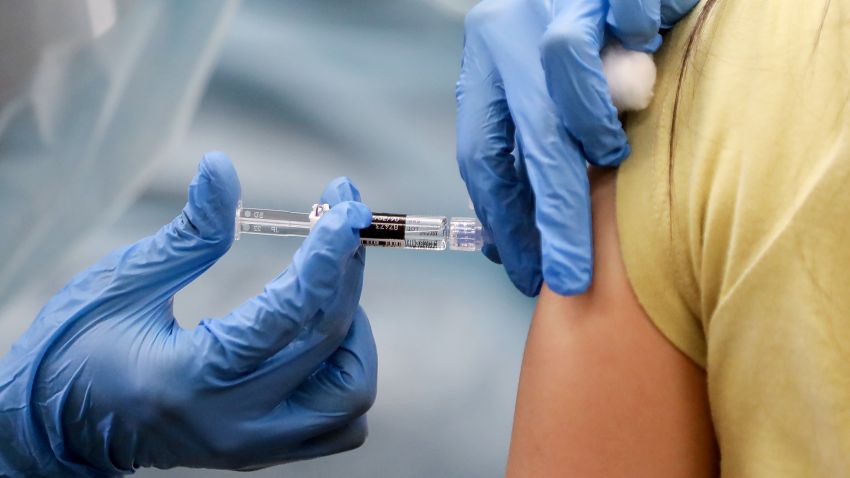
… as local governments are hobbled by staff shortages
Other parts of communities’ critical infrastructure are being affected by the surge and the staffing setbacks that come with it.
“You are certainly going to see stresses on the system,” Dr. Anthony Fauci said Sunday on CNN’s “State of the Union,” referring to the “critical jobs to keep society functioning normally.”
“We already know that there are reports from fire departments, from police departments in different cities that they’re 10, 20, 25 and sometimes 30% of the people are ill,” he said. “That’s something that we’re going to need to be concerned about.”
John Cranley, mayor of Cincinnati, declared a state of emergency last week, allowing the city’s fire chief to take certain steps to adequately staff the department as firefighters called out sick. That includes the ability to implement mandatory overtime, something Cranley acknowledged might be “unpopular.”
“But we’ve got to make sure that the basic services that our citizens depends upon are being serviced every day,” he told CNN on Saturday. “There’s no question that these are not ideal circumstances. These are tough choices that have to be made.”
Matt Alter, president of the Cincinnati Fire Fighters Union Local 48, expressed concern, telling CNN affiliate WCPO Thursday overtime for a firefighter could mean working 48 hours straight. “We’re asking for superhuman feats,” he said.
About 30% of New York City EMS workers and about 17% of firefighters were out sick last week, according to a FDNY spokesperson. That’s more than were on medical leave in March and April 2020, when the city was the epicenter of the pandemic in the US in its early days.
The FDNY is pleading for New Yorkers to call 911 only for a “real emergency.” And emergency medical services were instructed in a directive on New Year’s Eve to not transport stable patients with flu-like symptoms so they could prioritize people in emergency situations.
Meantime, 21% of the New York Police Department’s staff was out sick Thursday, officials said – again, exceeding the previous peak in March 2020. Now the department is canceling days off and switching shifts to ensure staffing levels are appropriate.
“We’re at the highest levels that I’ve ever seen in my career,” outgoing NYPD Commissioner Dermot Shea said at a news conference Thursday.
Hospitals are overwhelmed …
US hospitals have been dealing with their own staffing setbacks as they faced a recent surge driven by the Delta variant. Now, with Omicron spreading rapidly, hospitals are further strained.
“The hospital is full, the ICU is full, and of course at the same time we’ve lost 20, 25% of the overall staff in the hospital due to them getting sick and having to stay home and isolate,” Dr. Anand Swaminathan, an emergency physician in New Jersey, said Sunday.
Another problem is more people coming to the hospital seeking Covid-19 tests, he said, after waiting hours at testing sites, only for those sites to run out of tests.
“Emergency rooms, hospitals, we’re not outfitted to do the type of testing that people need,” he said. “But we also know that we’re the only option they have left.”
University of Maryland Capital Region Health on Friday announced it was activating emergency protocols due to a sharp increase in cases that overwhelmed emergency departments and field staff shortages. And in New York and New Jersey, 31 of CityMD clinics temporarily closed to “preserve our ability to staff our sites,” the company said on its website.
Early research suggests Omicron may cause less severe illness.
“It does appear now, based on a lot of experimental evidence that we’ve gotten just in the last two weeks, that this is a milder form of the coronavirus,” Dr. Scott Gottlieb, former commissioner of the US Food and Drug Administration, said on CBS’ “Face the Nation” on Sunday. He characterized the variant as “more of an upper airway disease than a lower airway disease,” which “is good for most Americans.”
However, Dr. Catherine O’Neal, chief medical officer at Our Lady of the Lake Regional Medical Center, said that’s not what she’s seeing at her hospital in Baton Rouge, Louisiana.
“What we’re seeing in the hospital today is the same thing we’ve seen at the beginning of every single surge,” she said this week. “To hear that Omicron is different and is not causing immense illness in people is not what we’re seeing on the ground.”
Many patients are unvaccinated and often have severe illness with pneumonia and need to be intubated. Others who are not boosted or only partially vaccinated have a flu-like illness, but most go home after a couple days, she said.
In Hennepin County, Minnesota, Dr. Andrea Rowland-Fisher, who specializes in emergency medicine, said it’s “a struggle” to find hospital beds.
“We’re having hospitals from rural Minnesota that don’t have capacity to take care of really sick people that can’t find a place to transfer their patients,” she told CNN on Saturday. “And patients are clearly suffering because they can’t get the care that they need.”
Dr. Megan Ranney, an emergency room physician and associate dean at the Brown School of Public Health, said it was difficult to describe the situation in her hospital’s emergency department, with doctors and nurses “at the end of their rope.”
“I have nurses and other physicians coming and kind of cry together in the break room, with a mask of course,” she said. “It’s difficult to describe what it is like right now to be a health care provider and not be able to provide the care you want to give. I’ll say our hospitals are doing everything they can. There is just not enough staff and not enough space.”
… and businesses are forced to turn customers away
Yet again, many businesses have had to close because of the coronavirus and face more uncertainty in 2022.
Beginning Monday, Chicago will require vaccines for restaurants and gyms, along with other indoor public places, in an effort to slow the rise in cases. For local restaurateurs, it’s a hard start to the new year, Kevin Boehm, co-founder of Boka Restaurant Group in Chicago, told CNN.
“It seems like this is a never-ending thing,” he said. “Here we are, 20 months into this fight, and it’s still a real struggle.”
While many business owners support the requirement, Boehm acknowledged it’s “problematic for restaurants in some ways,” because they have to enforce the policy.
“People can be argumentative over it at the front door,” he said, “and specifically here in Chicago, you don’t want to give people extra reasons not to dine when it’s 5 degrees outside.”
Boehm, the co-founder of the Independent Restaurant Coalition, noted the policy comes as restaurants across the country had to cancel holiday parties, losing money.
“Normally a restaurant like Che Fico – and a lot of restaurants – are booked solid for New Year’s Eve. It’s the biggest revenue night of the year,” David Nayfeld, chef and co-owner of Che Fico in San Francisco, told CNN. But “many of us, including Che Fico, have had to shut down because of the spike.”
Lara Ferreira, owner of The Third Door Cocktail Bar in Marietta, Georgia, just north of Atlanta, closed for the week when several employees tested positive for Covid-19 after Christmas. She was disappointed but recognized this isn’t the right time for people to gather together.
“We just have to tighten up and go lean for a little bit here,” she told CNN affiliate WSB.
The restaurant Avenue in Clayton, Missouri, near St. Louis, closed this week after positive tests among its staff, reported CNN affiliate KMOV.
“We had to close for Christmas Eve, which was going to be a big night,” said owner Bryan Carr, and then they had to close for New Year Eve. His focus was helping his employees however he could in the meantime – they were doing curbside dinner and the restaurant has a GoFundMe to raise money for staff.
“It’s not good,” Carr said, “but what else are you going to do?”
CNN’s Alisha Ebrahimji contributed to this report.

